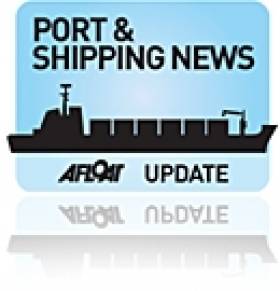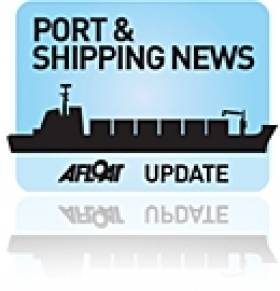Displaying items by tag: IMDO
Car-Sales Boost Brings Busy Day to Dublin
Normally the Pauline operates on other routes. She along with her sister Yasmine are the largest vessels in the Compagnie Luxemburgeoise de navigation SA (CLnd) / Cobelfret fleet. The vessels are of the Con-Ro design, also known as the 'HumberMax' vessels which have 5,632 lane metres capable of carrying 258 container trailers and 656 cars.
Apart from the Dublin debut of the Pauline which docked at Ocean Pier, the final vessel of the trio, Celestine (1996 / 23,986grt) was the first to arrive from Zeebrugge, docking at the ferryport berth 51A (also used daily by Stena Line vessels). Like the Pauline, the Opaline (2009 / 25,235grt) docked at Ocean Pier and is the newest and last of six newbuilds built from German yard of FGS Flensburg.
CLnD won the Short-Sea Shipping Company Award in 2010 at the Irish Exporter Awards in November and hosted by the Irish Exporter Association (IEA). The award was sponsored by the Irish Maritime Development Office (IMDO) which recognises the strategically important role of short sea shipping to our island economy.
There are four sailings operated by CLnD between Dublin Port and Rotterdam / Zeebrugge. From the Dutch port there are onward sailings linking Göteborg and Esbjerg while the Belgian route connects the UK ports of Killingholme, Purfleet and Ipswich.
The development of the Irish routes are part of the "Motorways of the Sea", an EU-wide programme to promote a modal shift of goods from congested roads to alternative sea transportation. In addition to the concept is the international trend in the use of larger and more efficient vessels.
In October 2009 CLnD /Cobelfret switched their Irish operations from Rosslare to Dublin Port. The transfer to Dublin allowed CLnD to introduce larger tonnage at the then newly upggraded No. 2 ro-ro linkspan at Ocean Pier, Alexandra Basin East.
CLdN ro-ro SA and CLdN ro-ro UK offer ro-ro connections from Belgium and the Netherlands to the UK, Ireland, Sweden and Denmark. Both divisions share a combined core fleet of 20 vessels. Some ships including the Pauline are registered and flagged from land-locked Luxembourg. The fleet operate on short sea ro-ro trade routes, occasionally supplemented by time chartered tonnage, which accommodate trailers, containers, vehicles and other rolling equipment.
New EU Passenger Rights for Sea & Inland Waterways
The European Parliament and European Council have formally adopted a regulation giving new compensation rights to passengers using water transport. The regulation is expected to come into force at the end of 2012.
"People are entitled to enjoy the same levels of quality and safety wherever they travel within the European Union. I am very glad that after introducing rights for air and rail passengers, we are now also able to introduce similar rights for passengers travelling by water" said Siim Kallas, Commission Vice President and responsible for transport.
The new regulation that will enable passengers travelling by sea and by inland waterways to enjoy the same rights wherever they travel in the European Union. The information can be viewed in full from the Irish Maritime Development Office (IMDO) website: www.imdo.ie
Below is a list of the new Passenger Rights.
•guarantee of reimbursement or rerouting in situations of cancellation or of delay at departure of more than 90 minutes;
•adequate assistance (such as snacks, meals, refreshments and, where necessary, accommodation up to three nights, with a financial coverage up to €80 per night) in situations of cancellation or delay at departure of more than 90 minutes;
•compensation, between 25% and 50% of the ticket price, in situations of delay in arrival or cancellation of journeys;
•non-discriminatory treatment and specific assistance free of charge for disabled persons and persons with reduced mobility both at port terminals and on board ships, as well financial compensation for loss or damage of their mobility equipment;
•minimum rules on information for all passengers before and during their journey, as well as general information about their rights in terminals and on board ships;
•establishment by carriers and terminal operators of complaint handling mechanism available to passengers;
•establishment of independent national bodies for the enforcement of the regulation, through, where appropriate, the application of penalties.
In addition further detailed information about passenger rights in all modes of transport can be found HERE.
IEA Export Industry Awards to Shipping
In the category of Short Sea Shipping Company of the Year, sponsored by the Irish Maritime Development Office, which recognises the strategically important role of short sea shipping to our economy, the winner of the award was CLDN Colbefret Group.
The Belgium operator opened two new routes from Dublin to Rotterdam and Zeebrugge in November last year, providing a range of transport options to Irish exporters selling to Europe. Since then Cobelfret have gradually introduced new Con-Ro (Containers and Roll-On/Roll-Off) vessels onto the continental routes. The six 25,000 gross tonnes newbuilds were built by FGS Flensburg, Germany and the latest unit Opaline, is due to make a Dublin debut tomorrow.
Cobelfret's operations in Dublin are based in Alexandra Basin East using the ports No. 2 ro-ro linkspan berth. A previous linkspan built in the 1950's was demolished last summer to develop a larger linkspan, to cater for larger tonnage like the Opaline. The new vessel has 2,907 lane metres for freight vehicles spread over three decks and a container capacity for 854 TEU mafi-trailers.
Donegal based Marine Harvest won the Seafood Export Award, sponsored by Bord Biá. The company is an indigenous fully-integrated salmon breeding, farming and processing operation, exporting premium products to Europe and North America.
The overall winner of the IEA's Export Industry Award for 2010 was the Irish Dairy Board.
IMDO Release Third Quarter Shipping Figures
The latest figures announced by the Irish Maritime Development Office (IMDO) has revealed that the volume of goods passing through Irish ports increased across all the main shipping segments during the 3rd quarter of 2010 compared to the same period last year.
Exports of container were up 12%, roll-on/roll-off volumes on Ireland – UK routes is up 3%, dry bulk volumes up 40%, and liquid bulk up 19%.
Containersized traffic shipped through ROI ports recorded a quarter-on-quarter volume growth for the 3rd quarter 2010 up 4% to 218,377 twenty equivalent units (TEU). This was primarily as a result of strong export demand, which rose by 12% in the last quarter.
This sector is characterized by export traffic to USA and Asia largely influenced by the multinational chemical and pharmaceutical industries and also established indigenous Irish exporting companies. The other factor contributing to the aggregate rise was the increase in container imports during this period. This was also the first quarter-on-quarter growth in import volumes since the beginning of 2009.
Roll-on/roll-off (ro/ro) traffic to the UK from ROI ports continued to make a steady recovery up 3% for the 3rd quarter which is consistent with overall figures for the 9 months from Jan – Sept period which is up 3%, to 568,833 units. The ro/ro segment is largely weighted towards services to and from the UK which remains our largest trading partner.
In the dry bulk trade, traffic through all Irish Ports continued to recover some of the large volume losses experienced in 2009 and is up 40% for the 3rd quarter compared to the same period last year and 26% for the first 9 months of 2010. Part of the rise is attributed to strong global demand for ore and mineral products such as alumina, while domestic demand in the agricultural sector experienced a rise in imports of grains, feeds and fertilizers. While the overall picture is positive; the main volume gains are distributed to the larger ports with some of the smaller regional ports still in negative territory.
Break bulk volumes of construction related products fell again in the third quarter, bringing the total decline for the third quarter to -10%. Between 2008 and 2010 over 700,000 tonnes of break bulk commodities have been lost from the market. Importantly the fall off in volumes has not slowed in 2010 with an average quarterly drop of 10%.
Liquid bulk volume rose in Q3 by 19% year-on-year. However overall volumes for the first 9 months of the year remain unchanged.
The outlook for the remainder of the year suggests that some volume recovery in the main market segments will be achieved this year. However the total volume in many segments are still running at 35% less than 2007 volumes. Many shipping operators also comment that while export volumes have remained resilient over this period, there are few new companies emerging in the export market. Otherwise there are concerns about the impact of austerity measures in the Euro zone and at home.
Source: Glenn Murphy, Director of the IMDO. For more about the IMDO logon here.
Demand for Ferry Travel Trebles During Aviation Crisis
73% of the traffic moved through the principal gateways along the central corridor with record numbers of passenger moving through Dublin Port. Elsewhere, similar increased demand was catered for by operators at Rosslare (23% share of traffic), while the new service from Cork also provided additional capacity and distribution to the south of the island.
Commenting on the numbers IMDO Director Glenn Murphy said “The measured and co-ordinated response of all ferry operators, port companies and other transport providers to this surge in demand has been exceptional. There was clearly excellent co-operation between the various groups in their response to this national situation, which was undertaken in an efficient and professional manner at a time when it was most needed.”
Ports and shipping lines provided added additional shuttle bus services to facilitate the surge in the numbers of foot passengers seeking to travel while ferry companies also endeavoured to ensure that all passengers were accommodated during the disruption, with sailings delayed to allow additional time to board the extra passengers.
The National Emergency Co-ordinating Committee also acknowledged the response of the ferry operators and ports in their efforts to relieve the pressures caused by the aviation crisis. The Taskforce noted there had been no increase in ferry passenger charges, despite the massive increase in demand. The constructive and proactive engagement of the ferry operators over the past few days is to be complimented.
Sailings are still running at high capacities on all main gateways, although there is still availability on most routes. Demand levels are expected to return to more normal seasonal levels over the course of next week. These figures come against the background of figures for the full year, recently reported by the IMDO which illustrated that passenger numbers remained constant during 2009 with no fall off in passenger volumes recorded despite the difficult economic conditions.

























































